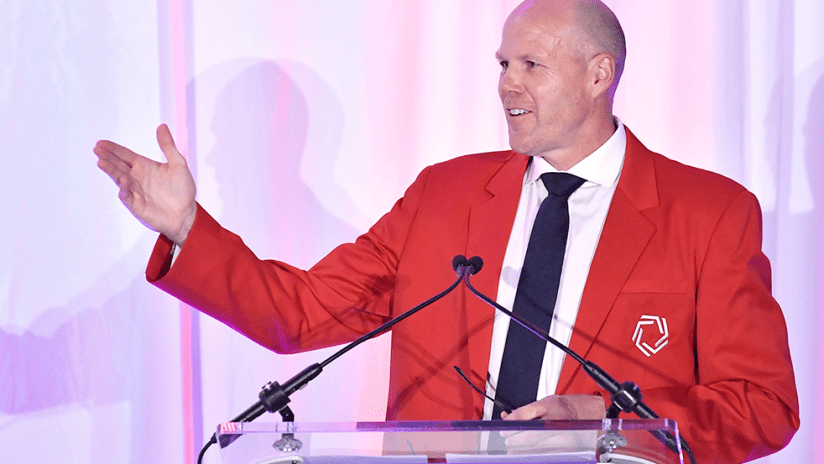FRISCO, Texas—As the Senior VP of Business Operations for the NBA's Los Angeles Lakers, Tim Harris would normally be front and center at the Staples Center to take in LeBron James’ home debut.
But he elected to jet to North Texas instead, attending on Saturday the 2018 induction ceremony at the National Soccer Hall of Fame, where he introduced his old friend Brad Friedel, a member of the Hall’s newest class of honorees and a former pupil in his past life as a goalkeepers coach at UCLA.
Harris’ choice says much about the relationship between the two, and the respect that Friedel earned at just about every stage of his career, which took him from a quiet childhood outside Cleveland to stardom at UCLA, Columbus Crew SC and a range of top European clubs in addition to a glittering US national team career, breaking records and winning a bevy of awards along the way.
“For goalkeepers, the North Star of excellence is a constant chasing of the number zero,” Harris said of the first-year New England Revolution coach. “Brad Friedel spent well over 20 years chasing the number zero. You see, Brad felt that if he could help his teammates to give away zero crosses or zero shots, then he would have zero pressure, and zero pressure means zero goals.
“But he knew that the guys on the other side were good and those things would happen, and so he approached it and said, ‘If I can give up zero rebounds, if I bobble zero crosses, if I concede zero corners, if I misplay zero back passes, if I can be perfect and make zero mistakes, then maybe, just maybe, we’ll give up zero goals. And if we give up zero goals, we have zero chance of losing.’”
That fierce mentality powered Friedel on an amazing journey from Denmark to Istanbul to Liverpool, the first stop in what would become his second home, the English Premier League, where he also represented Blackburn Rovers, Aston Villa and Tottenham Hotspur. By the time he called time in 2015, his professional career had spanned an incredible 23 years.
In Friedel's induction speech, he revealed two key moments that instilled that dogged mindset. The first occurred during his high-school days in Bay Village, Ohio, when his school’s American football coach got wind of Friedel’s plans to play soccer instead of the gridiron game.
“‘How on earth would you play soccer? You will amount to absolutely nothing in your life if you play soccer,’” Friedel said, recalling his old coach's words with a grin. “Ohio, it’s a meat-and-potato kind of place, it is American football, basketball, baseball – and he looked at me like I had 10 heads. And I walked out, and that was it. I was playing soccer.”
The other took place when he first arrived at Turkish heavyweights Galatasaray in 1995.
“My first week there, I walk into the locker room, I sit down – you were only allowed three foreigners at that time – and one of the players who speaks a little bit of English comes over, sits next to me and puts his arm around me,” recounted Friedel. “And he says, ‘That’s my best friend over there.’ And it was the other goalkeeper. He goes, ‘You’re not wanted here, you’re not needed here.’ And that’s the welcome. So very early in my life and very early in my career, I knew what it took and I knew I had what it took inside to persevere through those times.”
He would go on to help the club win the Turkish Cup, the first honor in a career marked by 82 USMNT caps, two World Cups and 132 shutouts in eye-watering 450 appearances across all competitions in England – a record among American players. At one point he racked up 310 consecutive Premier League starts.
Through it all, he said, the fear of failure and the desire to prove the “doubters and haters” wrong were the most powerful weapons in his arsenal.
“Not everyone will like you, not everyone will love you. You have to earn every ounce of respect that you get in this game,” he said. “And sometimes you have to start at the bottom level to get up to the top.”
Friedel achieved all this amidst American soccer’s golden generation of goalkeepers. First he competed keenly with Tony Meola for the USMNT’s starting role, and later with Kasey Keller. His description of those battles may offer Revolution fans a window into his approach to the task of revitalizing that club’s fortunes.
“The great thing about it – and we’re all friends today – is that we made each other better. If you have that competition, you can go places,” said Friedel. “What we have in this country now is competition – it’s starting to get there. And we can go places. In the rest of the world, they have competition, and it is fierce. And we can go places.”













